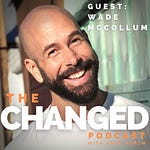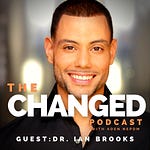This week on the Changed Podcast, guest Chris O'Connell gets vulnerable. And I mean really vulnerable. Talking about mental illness, health and well-being is challenging. Though thanks to people like Chris, maybe a bit less so...
As a NED and consultant on leadership, change management, and recruitment, Chris is on a mission to help leaders build purpose-led businesses that perform while making room for vulnerability and good mental health in the workplace.
In this very important conversation on the Changed Podcast, we talk about removing the mask and understanding the role of mental health in the workplace. This includes the topic of surviving suicide. While many conversations on this show are inspiring, and uplifting (this one is too), we also do not shy away from challenging reflections either.
This topic isn't easy, and we do not dance around it, but it is crucial that we de-stigmatize these kinds of conversations so that more people can get the important help they need to find the resilience they want.
I am grateful to Chris for being honest, for being open, and being willing to answer my questions. This conversation took some unexpected turns for me.
Takeaways from this conversation:
Suicide is more common than most of us care to admit, ideating suicide even more so, and 2020 has seen a steep increase in the number of people opting out. I cannot think of a more pivotal experience, than thinking you are ready to die, and choosing to live instead.
When it comes to surviving suicide, or thoughts of suicide, there are a couple of mental frames Chris and I discussed.
It's not enough to think about the people in your life and ask yourself whether or not you think they'd be better with or without you. Instead, imagine yourself in their shoes. Really try and see it from their point of view. Perhaps the desire to spare them from the intensity of pain they might go through with your loss might be enough to stall you until you can seek help.
Consider that the idea of relief through suicide might be an unkind, temporary lie your brain is telling you. The truth is we have no clue what happens to our souls when we die. Perhaps there is heaven and hell. Perhaps it all just stops. Maybe we get reincarnated. The point is... we don't know. There simply is no way to verify. And that means, there is no guarantee that things improve in any way for you. There may be no relief. It could be worse.
We think it is unethical when a single individual plays the role of judge/jury/executioner and takes the life of someone else. We do not like it one bit. Maybe this is like that.
Talking about these things helps. It's hard. It's uncomfortable. And it's necessary. Dark thoughts happen for most of us at one time or another, whether it's anxiety, depression, or the dark pit of despair... talking about it is a lifeline to surviving suicide, rather than succumbing.
Resources:
If you are interested in learning more about Chris O'Connell, you can find him on LinkedIn.
If you find yourself or have a loved one who is in the deep pit of despair, perhaps having the number to the US National Suicide Lifeline might help: 1-800-273-8255... or simply dial 988
An ounce of prevention is worth a pound of cure. In pursuit of better mental health, you may want to take advantage of the therapist finder from
Get full access to Making This up as I Go at makingthisup.substack.com/subscribe














Share this post